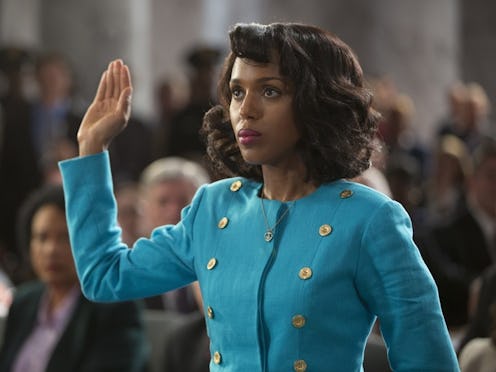Entertainment
Anita Hill's Testimony Had Supporters

HBO's new courthouse drama movie is a controversial one. Set to premiere Saturday, April 16, Confirmation documents the 1991 Supreme Court nomination hearings in which law professor Anita Hill testified against former colleague and future Supreme Court Justice, Clarence Thomas, and alleged that Thomas had sexually harassed her. Thomas denied all allegations of sexual harassment in response. Following the hearings, Thomas went on to be confirmed to the court and the allegations continue to be an unsolved, he-said-she-said case. But as HBO prepares to launch its film about Thomas' confirmation, one question rises to the top: who openly believed Thomas was guilty of the sexual harassment charges at the time of his 1991 hearings?
Before we can get into anything about who chose whose side in these hearings, let's set the scene: After the retirement of Supreme Court Justice Thurgood Marshall, President George H. W. Bush nominated Clarence Thomas as a new Supreme Court justice in 1991. Thomas started the requisite approval process shortly thereafter and the initial questioning was uneventful until Hill made claims that Thomas had sexually harassed her when she was working under him at the Equal Employment Opportunities Commission. Hill claimed that she had rebuffed Thomas's alleged pressure to date him and that he allegedly proceeded to harass her with rather graphic, sexually suggestive remarks, among other inappropriate behavior. Hearings about the accusations proceeded, but ultimately, Thomas was sworn in as an associate justice of the Supreme Court, with the Senate voting him in 52-48.
During the hearings, three of Hill's friends — Susan Hoerchner, Ellen Wells, and John Carr — testified on her behalf. They each claimed that Hill had talked about the ordeal at the time, particularly about allegedly being asked out by Thomas repeatedly, and that Hill was feeling horrible about the way she claimed he was treating her. "She told me that she was very humiliated and demoralized by Mr. Thomas' behavior and that it had shaken her faith in her professional ability," Hoerchner claimed at the time. But Hill wasn't only supported by people in her inner circle.
One of Thomas' former employees, Angela Wright, claimed that Thomas had been inappropriate with her (she later had her claims highlighted in a column in 1994, "The Other Woman" by Florence George Graves of The Washington Post ). According to the New York Times, Wright was consequently subpoenaed by the Judiciary Committee, but the committee later elected not to have her testify, entering an unsworn transcript of a telephone interview into the record instead. The following is an excerpt of Wright's statements from the transcripts, as obtained by the New York Times:
"About the only thing I can tell you is that he did tell me at one point during that conversation when I asked him about why he was firing me that he was real bothered by the fact that I did not wait for him outside his office after work. It was a statement that I dismissed as one of his statements. . .
I feel that the Clarence Thomas that I know is quite capable of doing just what Anita Hill alleges. . . "
But Hill had supporters in high places as well. Before Hill became a part of the hearings, then-California Representative Barbara Boxer, along with six other women from the House, famously demanded that the Judiciary Committee take Hill's claims seriously.
As far as public opinion goes, the nation was certainly divided... although maybe not as divided as the media portrayed it. Some Civil Rights groups, including the N.A.A.C.P., opposed Thomas's nomination, but mostly on the grounds that his conservative views didn't favor the well-being of the black community. The bigger separation was more about gender: Women tended to sympathize with Hill and be against Thomas's nomination more often than men did, according to several 1991 polls taken by news organizations, but plenty of women supported Thomas's nomination. Ultimately, the public, for the most part, wasn't as deeply swayed by Hill's testimony as one would think.
Thomas, for his part, repeatedly denied the allegations, and asserted his innocence in to the Judiciary Committee:
"I deny each and every single allegation against me today that suggested in any way that I had conversations of a sexual nature or about pornographic material with Anita Hill, that I ever attempted to date her, that I ever had any personal sexual interest in her, or that I in any way ever harassed her."
And while we may never have an answer about which party was definitively telling the truth, the effects of the case will continue to reverberate in discussions of sexual harassment for years to come, and certainly after HBO's new film brings its version of the story to a new generation.
Image: HBO